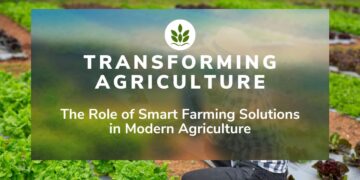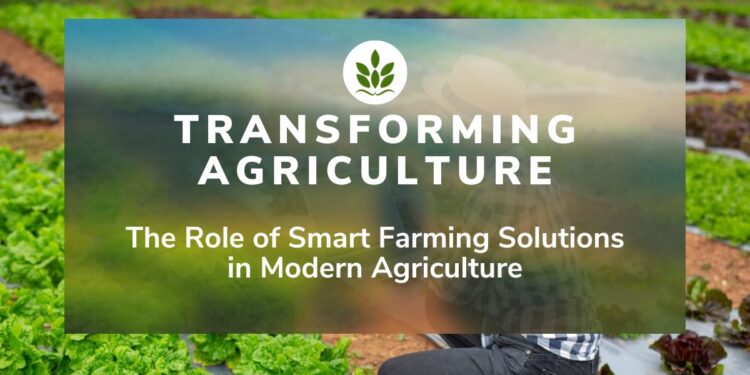The global agricultural sector is undergoing a significant transformation, largely driven by the advent of smart farming solutions. These technologies leverage advanced sensors, data analytics, automation, and artificial intelligence (AI) to enhance the efficiency and productivity of farming operations. The integration of smart technologies into farming—commonly known as smart agriculture—has created opportunities to address critical challenges such as climate change, resource management, and increasing food demand.
This article explores how smart farming solutions are revolutionizing agriculture, the key benefits they provide, and why collaborating with a smart agriculture solution company is essential for farmers and agricultural enterprises in today’s digital age.
What is Smart Farming?
Smart farming, often referred to as precision agriculture, involves the use of advanced technologies to monitor, automate, and optimize farming operations. It focuses on making farming more data-driven, efficient, and sustainable.
Core Components of Smart Farming Solutions:
- IoT (Internet of Things): Sensors and devices collect data from fields, animals, and equipment.
- Big Data and Analytics: Analyzing data helps make informed decisions regarding crop management, irrigation, and pest control.
- AI and Machine Learning: Predictive algorithms optimize planting cycles, yield forecasts, and equipment usage.
- Automation: Drones, robotics, and automated machinery reduce human labor and increase efficiency.
The Growing Need for Smart Farming Solutions
1. Addressing Global Food Demand
According to the United Nations, the global population is expected to reach nearly 10 billion by 2050, increasing the demand for food by 60%. Traditional farming methods struggle to meet this demand without degrading environmental resources. Smart farming solutions provide the tools needed to boost productivity while reducing the strain on water, land, and labor resources.
2. Improving Sustainability
Agriculture is a significant contributor to greenhouse gas emissions, and with the increasing focus on sustainability, farming practices need to be more environmentally friendly. Smart farming technologies allow for resource-efficient practices, minimizing the environmental footprint while maximizing yields.
Fact: The Food and Agriculture Organization (FAO) reported that precision agriculture could reduce pesticide use by up to 30% and save water by up to 50%, significantly contributing to sustainable farming.
3. Efficient Resource Management
Managing resources such as water, fertilizers, and energy is a major challenge for farmers. Smart farming technologies provide real-time data to optimize resource allocation. For instance, moisture sensors embedded in the soil can determine when and how much irrigation is necessary, reducing water waste.
Benefits of Smart Farming Solutions
1. Enhanced Crop Monitoring
One of the main advantages of smart farming is the ability to monitor crops at an unprecedented level of detail. IoT sensors placed in fields collect data on soil moisture, nutrient levels, and temperature. This data allows farmers to make real-time decisions, reducing crop stress and optimizing growing conditions.
2. Precision Agriculture
Precision agriculture uses technology to ensure crops and soil receive the exact inputs they need for optimal health and productivity. GPS-guided tractors, drones, and satellite imagery are examples of tools that enable farmers to apply fertilizers, pesticides, and water only where needed, reducing waste and maximizing output.
Example: A farmer using precision agriculture techniques can apply fertilizers to specific areas of a field that require them instead of spreading them uniformly, reducing both costs and environmental impact.
3. Labor Savings
Automation is a key feature of smart farming. Automated machinery and robotics take over tasks like planting, weeding, and harvesting, allowing farmers to focus on more strategic operations. This reduces the need for manual labor and increases efficiency.
Statistical Insight: In 2020, the global market for agricultural robotics was valued at $5.4 billion and is projected to grow at a CAGR of 19.3% from 2021 to 2028, according to Grand View Research.
4. Yield Optimization
Using AI and machine learning algorithms, farmers can predict yield outcomes more accurately. By analyzing data from previous seasons, smart farming systems can forecast the optimal planting and harvesting times, improving yield quality and quantity.
Fact: Studies indicate that farms using precision agriculture have experienced yield improvements of up to 20% compared to traditional farming methods.
Key Technologies in Smart Farming
1. Internet of Things (IoT)
IoT forms the backbone of smart farming. It involves a network of sensors that capture data from various aspects of the farm—soil, weather, livestock, and equipment. This real-time data helps farmers make quick and informed decisions.
Example: IoT sensors can notify a farmer if a section of the field is under-watered, prompting immediate corrective action.
2. Drones and Satellite Imagery
Drones equipped with cameras and sensors provide farmers with aerial views of their fields, helping them monitor crop health and detect issues like pest infestations or water stress. Satellite imagery offers a broader, more comprehensive view of large-scale farms, enabling more efficient management.
3. Artificial Intelligence (AI)
AI and machine learning algorithms analyze data to optimize farming practices. AI can predict weather patterns, assess soil conditions, and recommend the best times for planting and harvesting. AI-driven insights help farmers make data-backed decisions, improving overall efficiency.
4. Automated Machinery
Automation in agriculture includes the use of GPS-guided tractors, harvesters, and drones that can operate with minimal human intervention. These machines work faster and more accurately than traditional manual labor.
Example: John Deere’s automated tractors can plant seeds with precision, ensuring optimal spacing and depth, leading to better crop yields.
Challenges in Smart Farming Adoption
1. High Initial Investment
While smart farming technologies offer significant benefits, the initial setup costs can be high. Small-scale farmers may struggle to afford the necessary equipment and software solutions. However, long-term savings in labor and resources often offset the initial investment.
2. Lack of Technical Expertise
Adopting advanced technologies requires technical expertise, which may not be readily available to all farmers. This is where partnering with a smart agriculture solution company becomes crucial, as these companies provide the expertise needed to implement and manage smart farming solutions effectively.
3. Data Security
With an increasing reliance on data-driven decision-making, data security becomes a critical concern. Farmers need to ensure that sensitive data about their crops, operations, and markets remain secure from potential cyber threats.
The Role of a Smart Agriculture Solution Company
Collaborating with a smart agriculture solution company can help farmers overcome many of the challenges associated with adopting new technologies. These companies offer end-to-end solutions, including consulting, equipment procurement, and technical support, ensuring that smart farming practices are implemented successfully.
Key Services Provided by Smart Agriculture Solution Companies:
- Custom Solutions: Tailored solutions based on the specific needs of the farm, whether it’s crop monitoring, irrigation management, or automated harvesting.
- Technical Support: Continuous support for troubleshooting, software updates, and system maintenance.
- Training and Education: Offering training programs to help farmers and farm managers understand and utilize smart farming technologies effectively.
Conclusion
Smart farming is transforming modern agriculture by enhancing productivity, improving resource efficiency, and making farming more sustainable. With the growing global demand for food, the role of smart farming technologies cannot be overstated. By adopting smart farming solutions, farmers can optimize their operations, reduce costs, and contribute to a more sustainable agricultural system.
As we move further into 2024, the collaboration between farmers and smart agriculture solution companies will be crucial for the continued success and expansion of smart farming practices. From IoT sensors to AI-driven insights, the future of agriculture lies in technology. Embracing these innovations will help farmers meet the challenges of the modern world while ensuring food security for future generations.
Casey Morgan is a Digital Marketing Manager with over 10 years of experience in developing and executing effective marketing strategies, managing online campaigns, and driving brand growth. she has successfully led marketing teams, implemented innovative digital solutions, and enhanced customer engagement across various platforms.























































